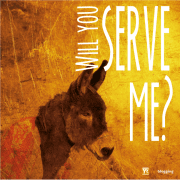Looking at the Easter Story with Fresh Eyes
While I’m a massive fan of Christmas, there is something about Easter that, on a spiritual level, I actually prefer. While Christmas is beautiful, Easter has more of a process, a Via Dolorosa (the way of grief). Observing this series of days—from Ash Wednesday, all the way up to Holy Week—that incorporate a sequence of spiritual practices, I find it life-giving for my faith.
First, there’s Lent that parallels Christ’s time in the wilderness, when it’s about learning to rely on God’s strength rather than our own.
When my husband decided it would be a good idea for us to “do” Lent, coffee was the most logical thing for me to abstain from. As mum to a school girl and a three month old baby, coffee can at times be my “saviour”. So Lent this year was about learning how to see God (again) as my Saviour.
I love the jubilance of Palm Sunday that follows Lent—remembering Christ’s triumphant arrival into Jerusalem prior to Passover. Reading this, we recognise how He is the Passover lamb the people are celebrating, knowing the danger that awaits Him only days later.
Then comes the heavy dread of Maundy Thursday, remembering Jesus’s final meal with His followers, and His anguished prayer in the Garden of Gethsemane. His arrest under the cover of darkness, followed by crucifixion on Good Friday.
And finally, the wonderful arrival of Easter Sunday, where even today Christians greet one another with “He is Risen”.
Like all features of our spiritual life, such recollections can become all too familiar, and so it can be helpful to take a fresh look at the story and see if we can look into details we hadn’t observed before, and perhaps arrive at reflections that carry a little more gravitas for whatever season we’re in.
I spent some time recently doing this, and here are a couple of things that have moved me to reflect on my faith:
1. Jesus purposefully, intently walked into His death
I’m often guilty of imagining Jesus as a waif of a human, wandering and drifting about in First Century Israel. In part I blame the movies we watched in my Christian school—the ones where Jesus is played by some blonde Caucasian guy who stares off into the distance and answers questions in ways that sound vague; who pops up here and there unpredictably, sometimes preaching, sometimes healing people.
But I was challenged recently to appreciate that Jesus was not random. His whole time in active ministry was well planned. I found the book The Dawn of Christianity by Robert J. Hutchinson massively beneficial in understanding the context of Christ’s ministry.
The trajectory of Jesus’s ministry had ruffled many feathers—not just the Romans, but more ominously the Pharisees and, dangerously, the Sanhedrin, who were the powerful people of the day, responsible for all legislative and judicial activities in Israel. They were not happy about Jesus’s ministry undermining their power.
And Jesus knew exactly what He was doing. When Jesus brought Lazarus back to life (John 11), it was a powder keg moment. The Pharisees called for a meeting of the Sanhedrin to discuss what to do with Jesus (vv.45-48), as they had sensed that this miracle marked the beginning of the end for them.
Well aware of what He had done and what would happen soon, Jesus laid low before Passover (John 11:54). From this, we can see that Jesus’s arrival in Jerusalem for Passover was intentionally timed. He knew full well that there was a bounty on his head, and he came willingly that Palm Sunday (John 12:12-19).
What would it mean if we fully appreciated just how intently Jesus walked to the cross, how He purposefully made his way towards it for our sake? That He was aware of the events leading up to His death even before He went to Lazarus that day.
If we fully understood just how God loved us to the point of death, would it change how we feel, about ourselves, about our life?
To know that Jesus sees worth in the person He made you to be, and He has a plan for your life, even when you don’t know your next step—would His purposeful walk into death give you the courage to purposefully live life?
I know how often I look at myself in the mirror and see only how much I fall short. But as profoundly as I feel my weaknesses and lack, the cross reminds me that He loved me so much that he proactively stepped into death so I could live. He took all of my weakness, shame, and sin upon Himself, so He could ransom me into a relationship with Him.
2. Jesus upends our idea of Messiah (Saviour)
Following his arrest under the cover of darkness (as to avoid a riot), Jesus is tortured, and then brought before Pilate (John 18). Pilate isn’t keen to execute this “King of the Jews”, and as it was custom at Passover to release a prisoner, he offers the crowd a choice between Jesus or a guy called Barabbas (v. 39-40). As we know, the crowd request the release of Barabbas, a murderer, a criminal.
This is my second point of reflection – Jesus was the not the Messiah they were looking for.
We know the type of Messiah they expected based on the people put next to Jesus on the cross—the “thieves”, who historians believed were likely not really robbers but actually rebels; violent, politically motivated men who looked to overthrow the status quo. There were groups of Jews who rebelled against Roman occupation in anticipation of the Messiah. But Jesus had made it very clear that He would not be this type of political, military Messiah.
I wonder sometimes if we are the same way: what kind of Messiah are we expecting in our lives? Do we expect God’s salvation to appear in the form of the perfect spouse, the ideal job, position, fortune, the list goes on?
I ask myself too, do I expect Jesus’s salvation in my life to look like business going well, everyone liking me, no conflict with anyone at any time, just God giving me good times all day every day? Sometimes I do.
Maybe you have an idea too of what having Jesus in your life should look like. Like the people of the time, I suspect we forget (or, actually, don’t care for) the kind of Messiah we have. A Messiah who made his mission clear in Luke 4:18-19:
The Spirit of the Lord is on me,
because he has anointed me
to proclaim good news to the poor.
He has sent me to proclaim freedom for the prisoners
and recovery of sight for the blind,
to set the oppressed free,
to proclaim the year of the Lord’s favor.
The “Good News” of the gospel is simply that God saves (which is what the name Jesus means).
The gospel is good news to me today, because Jesus’s reality in my life means I am no longer captive to sin (Romans 6:7). That Jesus has saved me means I am not subject to spiritual blindness, and I am able to encounter God and delight in that relationship.
Because Jesus is my personal saviour, He knows the battles I face every day, against situations and circumstances, but also against myself, the negative self-talk and worry. He is my Messiah in all this, so I am not held in bondage to anxieties and worries and uncertainties that seek to grip my heart.
After Christ died, it says that a man named Joseph of Arimathea came and requested possession of his body. Joseph laid Jesus in a tomb that he had purchased for his own family. (John 19:38).
Curiously, Joseph of Arimathea was a member of the Sanhedrin, and in his request to Pilate for Jesus’s body, he makes no attempt to hide his involvement with Jesus, even though it would have been pretty dubious for his reputation.
I found myself reflecting on the risk for Joseph, a member of the Sanhedrin, to do what he did. I’m reminded that being a follower of Jesus is going to cost me something (Luke 14:27-33).
When I made the decision to go to Bible College years ago, many of my friends (who were not Christians) thought I’d lost my mind, that I saw myself as above them. They subsequently ended their friendship with me. I stopped getting invited to everything. It was like I didn’t exist.
Following Jesus cost me friendships I’d had for four to five years, leaving me very suddenly alone. But God has been faithful to walk with me. While I may have losses on this side of heaven, I am assured that I gain eternity with Christ (Matthew 16:25-27), and that will be everything.
As I approach Easter this year, I want to see it through fresh eyes. I want to feel the profound power of Holy Week, by appreciating just how purposefully Jesus laid down his life for me, and understanding the kind of Messiah He is in my life; by pursuing the good news, not the perfect life, and accepting that ultimately, following him will bear a cost, but it will be worth it.
















Leave a Reply
Want to join the discussion?Feel free to contribute!